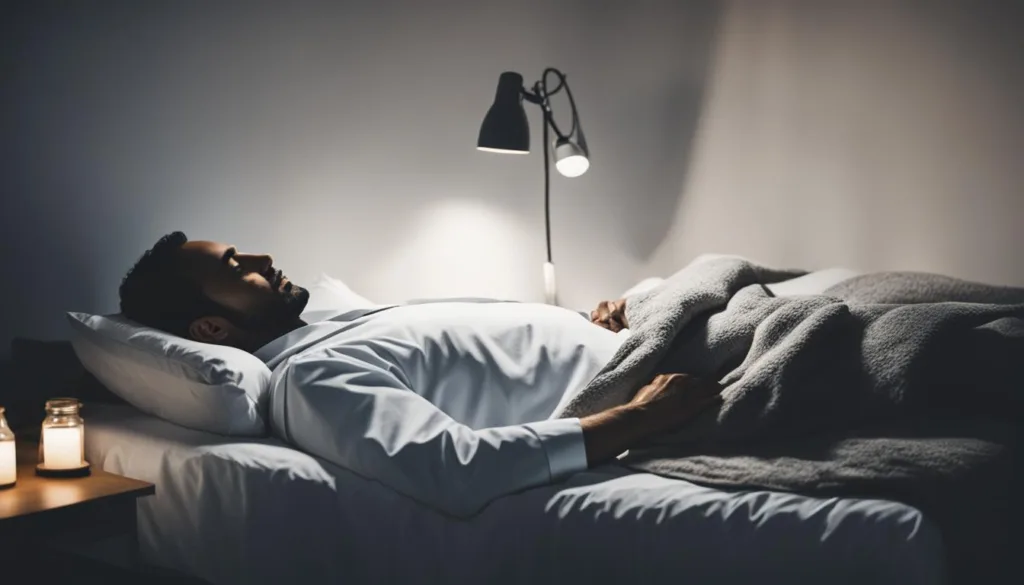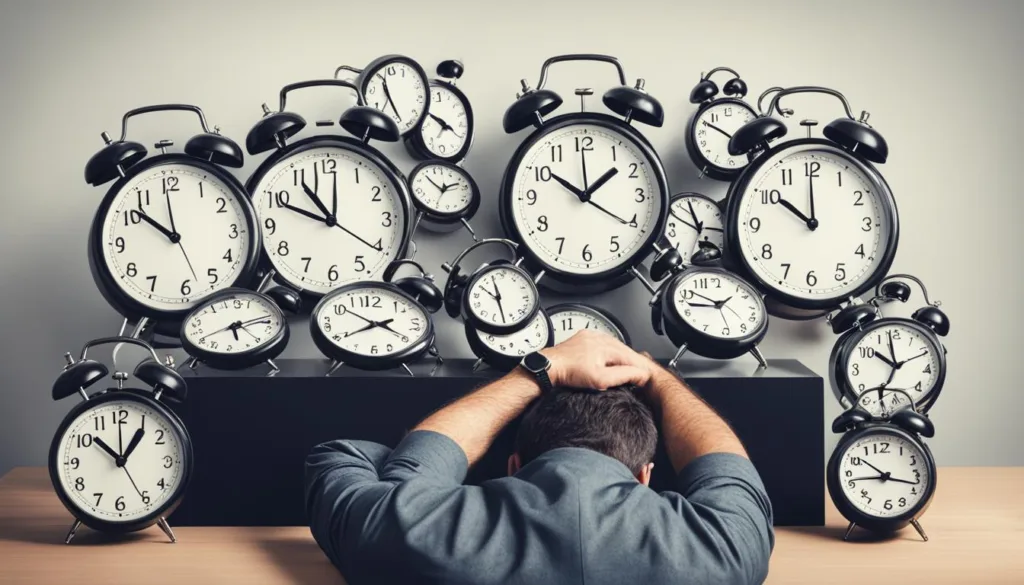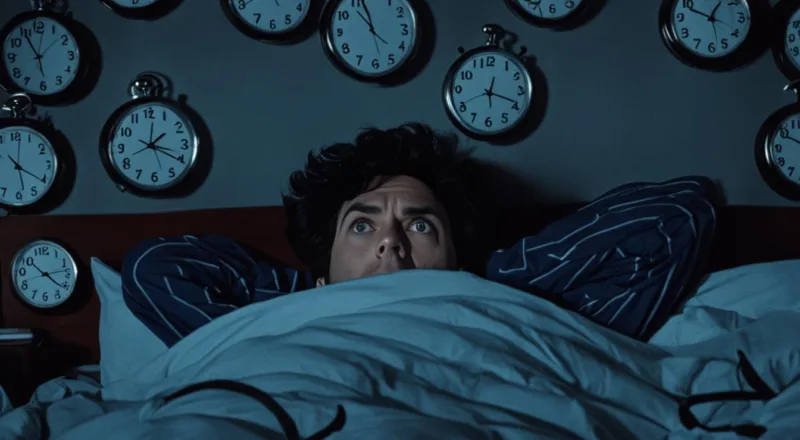7 Extraordinary Tips to Manage Short Sleep Syndrome and Wake Up Energized Every Morning
Energize Your Mornings: Conquer Short Sleep Syndrome with Expert Tips and Wellness Strategies
#sleep management, #Short Sleep syndrome, #manage Short Sleep Syndrome, #excessive daytime sleepiness.
Introduction:
In this article, we will provide you with 7 extraordinary tips to effectively manage Short Sleep Syndrome and ensure that you wake up feeling energized and refreshed every morning.
Short Sleep Syndrome is a sleep disorder characterized by a persistent inability to obtain sufficient sleep, leading to excessive daytime sleepiness and other related symptoms.
By incorporating these tips into your daily routine, you can improve your sleep quality, duration, and overall well-being.
Key Takeaways:
- Short Sleep Syndrome is a sleep disorder that can lead to excessive daytime sleepiness.
- Establishing a consistent sleep schedule is crucial for managing this disorder.
- Creating a relaxing bedtime routine can help improve sleep quality.
- Your sleep environment can have a significant impact on the quality of your sleep.
- Practicing mindful nutrition can support your sleep routine.
Establishing a Consistent Sleep Schedule
Do you find yourself having trouble falling asleep at night? Or struggling to wake up in the morning? If so, establishing a consistent sleep schedule could be the key to a better night’s rest.
When dealing with Short Sleep Syndrome, going to bed and waking up at the same time every day can regulate your body’s internal clock and promote better sleep patterns.
By creating a sleep routine and sticking to it, even on the weekends, you can help your body recognize when it’s time to sleep and when it’s time to wake up.
This consistent sleep schedule improves your sleep quality and duration, leading to waking up energized and refreshed every morning.

Healthy Sleep Routine
When establishing a sleep routine, set a bedtime that allows for 7-8 hours of sleep. If you need to gradually adjust your sleep schedule, try changing your sleep and wake times by just 15-30 minutes each day. Avoid using electronic devices before bed to help your body relax and unwind.
Remember that everyone’s sleep needs are different, so adjust your schedule to what works best for you. It may take some time to establish a consistent sleep schedule, but the results are well worth it.
Benefits of Consistent Sleep Schedule
| Improved Sleep Quality | Reduced Sleep Disturbances | Less Daytime Sleepiness |
|---|---|---|
| Helps regulate internal body clock | Minimizes sleep onset latency | Less likelihood of falling asleep during the day. |
| More restful sleep | Reduces wake after sleep onset | Improved cognitive functioning. |
| Increased duration of sleep | Enhanced mood and overall well-being |
Creating a Relaxing Bedtime Routine
When it comes to managing Short Sleep Syndrome, creating a relaxing bedtime routine can be especially beneficial. A calming routine can prepare your mind and body for sleep and help you achieve a more restful night. Here are a few ideas to get started:
Reading
Curling up with a good book before bed can be incredibly relaxing. It distracts your mind from the stresses of the day and can help you unwind. However, avoid reading on electronic devices, which emit blue light and can interfere with your sleep quality.
Taking a Warm Bath
A warm bath can be a great way to relax your muscles and reduce tension before bed. It can also help soothe your mind and promote a feeling of calmness. Try adding a few drops of lavender essential oil to the bathwater for an extra indulgent experience.
Practicing Relaxation Techniques
Deep breathing, meditation, or gentle yoga can also be effective relaxation techniques that can help you wind down and prepare for sleep. These practices can reduce stress, anxiety, and muscle tension, promoting a more peaceful state of mind.
Remember that while a bedtime routine is important, it should be tailored to your preferences and needs. Choose activities that you enjoy and that help you relax. By creating a bedtime routine that suits you, you can set yourself up for a more restful and rejuvenating sleep.
Optimizing Sleep Environment
Your sleep environment plays a crucial role in ensuring quality sleep. We recommend creating optimal sleep conditions in your bedroom by:
- Keeping your bedroom quiet, dark, and cool to promote relaxation and reduce sleep disturbances.
- Investing in a comfortable mattress and pillows that support your preferred sleep position to prevent discomfort that can disrupt sleep.
- Removing distractions such as electronic devices from your bedroom to minimize screen time and exposure to artificial light that can interfere with sleep.
- Minimizing noise levels to create a peaceful and restful sleeping environment.
Quality Sleep is Essential for Overall Wellbeing
Remember, the optimal sleep environment may vary from person to person, so try different combinations until you find what works best for you.
Creating an environment that promotes quality sleep is essential for managing Short Sleep Syndrome.
Mindful Nutrition for Better Sleep
Attracting quality sleep can be greatly influenced by what you eat. While many foods can help us sleep, others can have the opposite effect. It’s important to choose sleep-friendly foods that promote both relaxation and good health.
Avoid caffeine close to bedtime to prevent its stimulating effects that may disrupt your sleep. Instead, choose beverages like chamomile tea or warm milk to promote relaxation. Alcohol intake should also be minimized, as it may lead to more frequent night waking and reduced sleep quality.
Healthy Eating Habits for Better Sleep Quality
When it comes to food, it’s best to avoid large meals late at night. Digestion diverts the body’s resources away from sleep and may interfere with sleep quality. Instead, opt for light, sleep-inducing snacks like a banana, crackers, or nuts. These foods are easy to digest and contain nutrients that stimulate relaxation.

Food List To be Avoided for Better Sleep
| Sleep-friendly Foods | Avoid |
|---|---|
| Fruits: bananas, kiwis, cherries | Caffeine: coffee, tea, soda, energy drinks |
| Vegetables: spinach, kale, broccoli | Alcohol |
| Whole grains: brown rice, quinoa, oats | Spicy foods |
| Lean proteins: chicken, fish, tofu | Fatty, heavy meals |
Plant-based foods can be especially beneficial for sleep due to their high vitamin and mineral content. Dark leafy greens like spinach and kale contain magnesium, which has been shown to improve sleep.
Cherries are a natural source of melatonin, a hormone that regulates sleep. Whole grains like oats and quinoa also contain magnesium and slow-digesting carbs that promote a steady release of glucose, helping you feel relaxed and drowsy.
Balanced Diet and Healthy Sleep
Including a variety of sleep-friendly foods in your diet can help you maintain a healthy sleep pattern and reduce the symptoms of Short Sleep Syndrome.
Aim for a well-balanced diet that includes whole foods like fruits, vegetables, whole grains, and lean proteins. By practicing mindful nutrition, you can effectively manage Short Sleep Syndrome and wake up feeling energized and refreshed every morning.
Regular Exercise and its Impact on Sleep
When dealing with Short Sleep Syndrome, engaging in regular physical activity can have a significant positive impact on your sleep quality.
Research has demonstrated the effectiveness of physical activity in regulating the circadian rhythm, promoting a deeper and more restorative sleep, and reducing symptoms of sleep disorders.
By making it a priority to include physical activity in your daily routine, you can manage Short Sleep Syndrome effectively and achieve better sleep quality.
Moderate Intensity Exercise
Aiming for at least 30 minutes of moderate intensity exercise most days of the week is recommended for optimal sleep benefits.
However, it’s important to avoid vigorous workouts close to bedtime, as they may have the opposite effect and lead to difficulty falling asleep.
Regular exercise is an excellent strategy to incorporate into your sleep hygiene routine and achieve better sleep quality when dealing with Short Sleep Syndrome.
Seeking Professional Help When Needed
If you find yourself struggling with Short Sleep Syndrome despite trying different tips and strategies, seeking professional help could be beneficial.
Consulting a sleep specialist or healthcare provider can help you evaluate your symptoms, diagnose any underlying sleep disorders and recommend appropriate treatment options. Our bodies and sleep patterns are unique and may require treatments targeted to our individual needs.
Seek Professionals Help
A sleep specialist will help you better understand your condition and suggest suitable therapy or medication to address your situation.
They can provide guidance tailored to your specific needs and help you regain a healthy sleep pattern. Regular monitoring helps to identify any changes to your condition and adjust the treatment as necessary.
Remember: managing Short Sleep Syndrome is a gradual process, and there is no one-size-fits-all solution. However, professional help can make all the difference in identifying the root cause of your sleep challenges and providing you with the right treatment.

Sleep Disorder Symptoms
Sleep Disorder |
Symptoms |
|---|---|
| Short Sleep Syndrome | Excessive daytime sleepiness, difficulty concentrating, mood swings. |
| Narcolepsy | Sudden episodes of sleep, cataplexy, sleep paralysis, hallucinations. |
| Sleep Apnea | Loud snoring, fatigue, irritability, morning headaches. |
| Insomnia | Difficulty falling asleep, waking up frequently, fatigue, mood swings. |
Sleep disorder symptoms can vary depending on the specific condition affecting you. You may experience a combination of some, or all of the symptoms listed in the table above.
If you have been noticing persistent symptoms that interfere with your quality of sleep, daily activities, or overall wellbeing, it may be time to seek professional help. Remember, everyone deserves quality sleep and professional help can take you a step closer to achieving that.
Importance of Sleep Hygiene
Managing Short Sleep Syndrome requires adopting healthy sleep habits, which collectively constitute sleep hygiene.
Establishing and maintaining a consistent sleep schedule is crucial in regulating body functions and promoting better sleep patterns.
It also ensures that you get enough sleep every day and avoid daytime sleepiness, a common symptom in Short Sleep Syndrome.
Environment and Sleep Quality
Creating a calming environment in the bedroom by reducing noise and light, investing in a comfortable mattress and pillows, and avoiding devices or activities that can interfere with sleep can also improve the overall quality of your sleep.
Practicing relaxation techniques like deep breathing, meditation, or yoga, and avoiding stimulants close to bedtime such as caffeine or alcohol can also contribute to sleep quality.
Healthy Sleep Habits
Remember, adopting healthy sleep habits is an ongoing process, so be patient and consistent in implementing these strategies for lasting results.
“Sleep hygiene is not a phrase. It’s a prescription for a good night’s sleep. Think of it as the gold standard of self-care that should be practiced every day to keep our sleep quality high.” – Dr. Adam Moscovitch
Understanding Short Sleep Syndrome
Short Sleep Syndrome, also known as natural short sleep duration, is a sleep disorder characterized by a persistent inability to obtain sufficient sleep, which typically lasts less than six hours per night.
Individuals with this condition may experience symptoms such as excessive daytime sleepiness, poor attention, and low energy levels.
It is important to distinguish Short Sleep Syndrome from other sleep disorders like hypersomnia, narcolepsy, and sleep deprivation, which have different causes and symptoms.
Sleep Deprivation Impact on Daily Life and Productivity
According to a study published in the journal Sleep Medicine, Short Sleep Syndrome affects less than 1% of the population and is believed to have a genetic basis.
While it may not necessarily be harmful, Short Sleep Syndrome can significantly impact an individual’s daily life and productivity.
Experts recommend understanding the specific nature of your sleep disorder to help you tailor your management strategies effectively.
In cases where Short Sleep Syndrome affects the individual’s daily life, individuals may consider consulting a healthcare professional for diagnosis and treatment options.

The Relationship between Short Sleep Syndrome and Hypersomnia
Hypersomnia is another sleep disorder characterized by an excessive need for sleep or prolonged nighttime sleep, leading to excessive daytime sleepiness.
However, unlike Short Sleep Syndrome, individuals with hypersomnia have no difficulty falling or staying asleep. Instead, they may experience difficulty waking up, prolonged nighttime sleep, and difficulty maintaining alertness during the day. It is crucial to distinguish between the two conditions as treatment options may differ.
Is Short Sleep Syndrome the same as Narcolepsy?
While both conditions involve excessive sleepiness, they differ in their causes and symptoms. Narcolepsy is a chronic neurological disorder caused by the brain’s inability to regulate sleep-wake cycles properly.
Individuals with narcolepsy may experience sudden bouts of sleep, known as ‘sleep attacks.’ In contrast, Short Sleep Syndrome occurs due to a natural and innate short sleep duration.
It is essential to consult a healthcare professional to identify the specific sleep disorder accurately and determine the best management strategies.
The Impact of Sleep Deprivation on Short Sleep Syndrome
Sleep deprivation is the condition of not getting enough sleep as the result of a lifestyle choice or external factors such as work or school schedules.
While Short Sleep Syndrome is characterized by a natural short sleep duration, sleep deprivation occurs due to a lack of sleep.
Both conditions may lead to similar symptoms such as excessive daytime sleepiness, fatigue, and decreased cognitive performance. However, the causes and management strategies for both conditions differ significantly.
Comparing Sleep Disorders
Short Sleep Syndrome |
Hypersomnia |
Narcolepsy |
Sleep Deprivation |
|
|---|---|---|---|---|
Definition |
A natural short sleep duration | An excessive need for sleep or prolonged nighttime sleep, leading to excessive daytime sleepiness | A chronic neurological disorder caused by the brain’s inability to regulate sleep-wake cycles. | A condition of not getting enough sleep. |
Main Symptoms |
Excessive daytime sleepiness, low energy, poor attention | Difficulty waking up, prolonged nighttime sleep, difficulty maintaining alertness during the day | Sudden bouts of sleep, cataplexy, hallucinations | Excessive daytime sleepiness, fatigue, decreased cognitive performance. |
Cause |
Natural short sleep duration | Unknown, may be related to other medical conditions or medications. | Genetic, caused by a deficiency of a neurotransmitter called hypocretin. | Lifestyle or external factors such as work or school schedules. |
Treatment Options |
Behavioral therapies, lifestyle modifications, sleep tracking techniques, and sometimes medication to address unusual sleep behavior associated with Short Sleep Syndrome. | Lifestyle changes, sleep apnea treatments, medication | Medication to manage symptoms, lifestyle changes, and behavioral therapy | Lifestyle modifications, promoting relaxation, and creating a conducive sleep environment. |
Treatment Options for Short Sleep Syndrome
Short Sleep Syndrome is a disorder that may require professional help to manage. While there is no specific cure for the syndrome, various treatment options can help improve sleep quality and reduce excessive daytime sleepiness.
Sleep medicine specialists are trained to diagnose and treat sleep disorders like Short Sleep Syndrome. They may recommend behavioral therapies, lifestyle modifications, sleep tracking techniques, and sometimes medication to address unusual sleep behavior associated with Short Sleep Syndrome. Consult a healthcare professional to explore suitable treatment options for your condition.
Behavioral Therapy for Insomnia
Behavioral therapies such as Cognitive Behavioral Therapy for Insomnia (CBT-I) can help patients change their behavior and attitudes towards sleep, leading to improved sleep quality.
This therapy typically involves a series of sessions with a sleep therapist who guides patients through various techniques to improve their sleep health.
Medications may also be prescribed to manage symptoms of Short Sleep Syndrome. Wake-promoting agents like Modafinil and Armodafinil can help combat excessive daytime sleepiness.
Sleeping Drugs should be taken under the supervision of a Healthcare Professional
However, these drugs should only be taken under the supervision of a healthcare professional, as they may cause side effects like nausea, headache, and anxiety in some patients.
Sleep tracking techniques like actigraphy and polysomnography can provide valuable insights into an individual’s sleep patterns and aid in the diagnosis of Short Sleep Syndrome.
Actigraphy involves wearing a wrist-worn device that measures movement and light exposure to determine sleep-wake cycles.

Sleep Tracking Techniques
Polysomnography involves spending a night in a sleep center where a healthcare professional monitors various body functions during sleep.
In final words, seeking professional help is crucial in managing Short Sleep Syndrome. Treatment options like behavioral therapies, medication, and sleep tracking techniques can help improve sleep quality and reduce the impact of Short Sleep Syndrome on an individual’s daily life. Consult a healthcare provider to explore suitable treatment options for your specific condition.
Conclusion
In conclusion, managing Short Sleep Syndrome requires a comprehensive approach that encompasses various aspects of sleep management.
By following the tips outlined in this article, we can effectively manage Short Sleep Syndrome, reduce excessive daytime sleepiness, and wake up energized and ready to conquer the day. Prioritizing sleep management is essential in maintaining our overall health and well-being.
Navigating Short Sleep Syndrome: Patience, Consistency, and Professional Guidance for Lasting Sleep Quality Improvement
Short Sleep Syndrome may seem overwhelming at first but remember that it is manageable. Improving our sleep quality is a gradual process, so let’s be patient and consistent in implementing these strategies for lasting results.
Remember, if you continue to struggle with Short Sleep Syndrome, it may be beneficial to seek professional help. A healthcare provider can help evaluate your symptoms, diagnose any underlying sleep disorders, and recommend suitable treatment options.
Good sleep management practices can make a significant difference in our daily lives, so let’s make sleep hygiene a priority and enjoy the benefits of a good night’s rest.
FAQ
What is Short Sleep Syndrome?
Short Sleep Syndrome is a sleep disorder characterized by a persistent inability to obtain sufficient sleep, resulting in excessive daytime sleepiness and other related symptoms.
How can I manage Short Sleep Syndrome?
Managing Short Sleep Syndrome involves incorporating various strategies into your daily routine. These include establishing a consistent sleep schedule, creating a relaxing bedtime routine, optimizing your sleep environment, practicing mindful nutrition, engaging in regular exercise, seeking professional help when needed, and prioritizing sleep hygiene.
Why is establishing a consistent sleep schedule important?
Establishing a consistent sleep schedule helps regulate your body’s internal clock, promoting better sleep patterns. By going to bed and waking up at the same time every day, even on weekends, you can improve the overall quality of your sleep.
How can I create a relaxing bedtime routine?
Creating a relaxing bedtime routine involves incorporating activities such as reading, taking a warm bath, or practicing relaxation techniques like deep breathing or meditation. By making your bedroom a peaceful and stress-free environment, you can prepare yourself for a restful night’s sleep.
What can I do to optimize my sleep environment?
To optimize your sleep environment, ensure that your bedroom is quiet, dark, and cool. Invest in a comfortable mattress and pillows that support your preferred sleep position. Remove distractions such as electronic devices and minimize noise to promote a more restful sleep.
How does mindful nutrition affect sleep?
Mindful nutrition plays a significant role in sleep quality. Avoid heavy meals, caffeine, and alcohol close to bedtime, as they can disrupt sleep. Instead, opt for sleep-friendly foods like fruits, vegetables, whole grains, and lean proteins, which promote relaxation and provide the necessary building blocks for quality sleep.
What is the impact of regular exercise on sleep?
Regular exercise can have a positive impact on sleep quality. It helps regulate your circadian rhythm, promotes a deeper and more restorative sleep, and reduces symptoms of sleep disorders. Aim for at least 30 minutes of moderate-intensity exercise most days of the week, but avoid vigorous workouts close to bedtime.
When should I seek professional help for Short Sleep Syndrome?
If you have tried various tips and strategies but continue to struggle with Short Sleep Syndrome, it may be beneficial to seek professional help. Consult a sleep specialist or healthcare provider who can evaluate your symptoms, diagnose any underlying sleep disorders, and recommend appropriate treatment options.
What is the importance of sleep hygiene in managing Short Sleep Syndrome?
Establishing and maintaining good sleep hygiene is crucial for managing Short Sleep Syndrome. This includes creating a relaxing sleep environment, sticking to a consistent sleep schedule, avoiding stimulants close to bedtime, and practicing relaxation techniques. By adopting healthy sleep habits, you can optimize your sleep quality and duration.
How can I better understand Short Sleep Syndrome?
Understanding Short Sleep Syndrome involves gaining knowledge about excessive daytime sleepiness, hypersomnia, narcolepsy, and other sleep disorders. Short Sleep Syndrome is characterized by a natural short sleep duration of less than six hours per night. Knowing the specific nature of your sleep disorder can help tailor effective management strategies.
What are the treatment options for Short Sleep Syndrome?
While there is no specific cure for Short Sleep Syndrome, various treatment options can help manage the symptoms and improve sleep quality. Sleep medicine specialists may recommend behavioral therapies, lifestyle modifications, sleep tracking techniques, and sometimes medication to address unusual sleep behavior associated with Short Sleep Syndrome.


